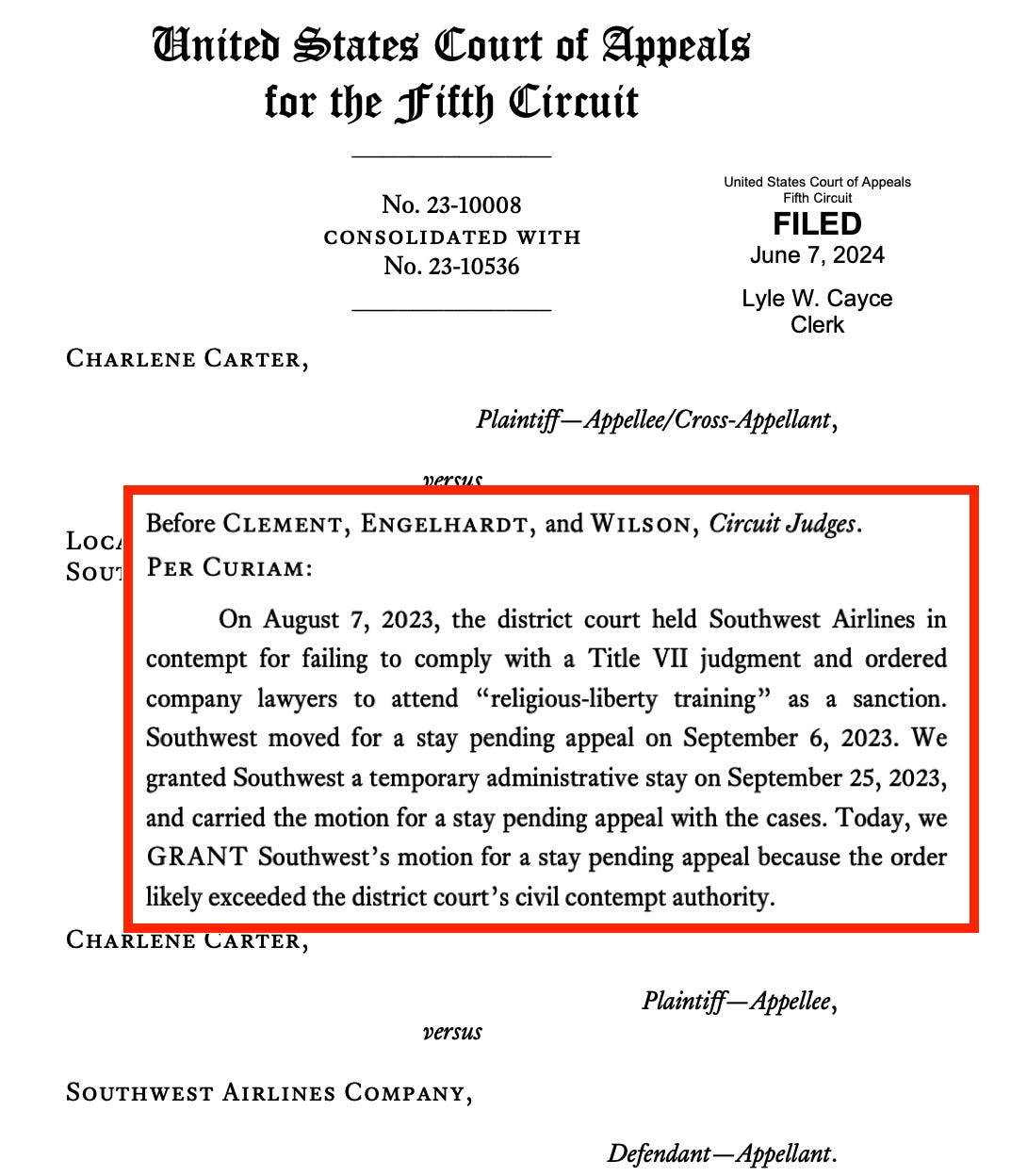Fifth Circuit blocks religious-liberty training order in Southwest Airlines case
If forced to attend the Alliance Defending Freedom training, "The Southwest attorneys … would likely suffer a violation of their constitutional rights,” the appeals court ruled.
The U.S. Court of Appeals for the Fifth Circuit blocked a district court judge’s order that lawyers for Southwest Airlines attend “religious-liberty training” from Alliance Defending Freedom as part of a contempt order, holding that the judge’s sought sanction is likely unconstitutional.
If forced to attend the training, a three-judge panel that included all Republican appointees held on Friday, “The Southwest attorneys … would likely suffer a violation of their constitutional rights.”
U.S. District Judge Brantley Starr, a Trump appointee, had mandated the training last summer in an order that I initially reported issuing sanctions against the airline for its response to a loss at trial in a religious discrimination case brought by a flight attendant, Charlene Carter, under Title VII of the Civil Rights Act of 1964. Judd Legum at Popular Information dug into the details of the underlying case — which involves a fight between a conservative flight attendant, the union, and eventually the airline — while my Law Dork coverage focused on the religious-liberty training order.
In the order, Starr specified that the airline’s lawyers were to attend eight hours of “religious-liberty training” to come from the far-right Christian legal advocacy group, Alliance Defending Freedom. The training itself is extremely troubling, as Friday’s order made clear, but the fact that an advocacy group — with extreme anti-LGBTQ and anti-abortion positions — was specified as the required “trainer” is troubling on another level altogether.
Although there was some back-and-forth last summer before Starr over whether the training would take place — covered extensively at Law Dork — a panel of the Fifth Circuit eventually issued an administrative stay in late September blocking the training temporarily. The panel, however, sent Southwest’s request for a stay of the contempt order pending appeal to the merits panel to resolve the matter more fully.
On Friday, that merits panel — in a per curiam order, unsigned and for the court — blocked the training for the remainder of the appeal, holding that “there is a strong likelihood that the contempt order exceeded the district court’s civil contempt authority.”
The order came days after Judges Edith Clement, Kurt Engelhardt, and Cory Wilson heard oral arguments in Carter’s case on June 3. Clement is a George W. Bush appointee to the appeals court, and Engelhardt and Wilson are both Trump appointees.
Despite that, no judge dissented from Friday’s order, which holds that Starr likely went too far with his order — terminology that reflected the procedural posture of the case, not doubt about their ruling.
Specifically, the appeals court pointed to the fact that the training isn’t really about Carter at all:
Carter receives no apparent benefit from the training requirement. The three attorneys ordered to attend training were not involved in the decision to terminate Carter and do not supervise Carter, and there was no evidence adduced at trial that they, personally, hold animus against Carter or her beliefs.
The appeals court concluded:
Among other things, the Fifth Circuit noted that the eight hours of “religious-liberty training” ordered by Starr “was not limited to Title VII training but rather encompassed all religious-liberty training, which could include topics like the First Amendment and the Religious Freedom Restoration Act that are irrelevant to securing compliance with a Title VII judgment.“
The appeals court’s ruling focused on the scope of a judge’s power to issue sanctions in a civil contempt setting, but it is important that, ultimately, the court — again, including two Trump appointees — addressed the constitutionality of the order as well.
“The training likely burdens their liberty interests too, as the injury of being forced into the training could not be undone,” the court held. Quoting from an earlier case, the court added, “It is the likely unconstitutional nature of the [punishment] that renders the harm it causes to [Southwest] irreparable.”
This is a breaking-news story. It may be updated after publication, so check back at Law Dork for the latest.
Death penalty update
There are three executions scheduled in the U.S. for June.
The first is scheduled for Tuesday, when Missouri plans to kill David Hosier for the 2013 for the murder of Angela Gilpin, 45. Hosier has maintained his innocence, and no evidence tied him to the scene where Gilpin and her husband were found killed.
Missouri is planning to proceed with the execution despite Hosier just recently having been released from the hospital for apparent heart failure. The Kansas City Star reported that Hosier was “[s]eated in a wheelchair gripping a cane” when reporters met him for an interview this week.
At the end of the month, Texas is scheduled to kill Ramiro Gonzales on June 26 and Oklahoma is scheduled to kill Richard Norman Rojem Jr. on June 27.
If the executions proceed, they would be the seventh, eighth, and ninth executions of the year. Alabama has carried out two executions and Georgia, Missouri, Oklahoma, and Texas have each carried out one execution thus far in 2024.
Last year, in contrast, 13 executions were carried out by Florida, Missouri, Oklahoma, and Texas in the first half of the year.





This is really good news for Southwest, however obviously still a major problem with several of the federal judges, because judge Barr never should have required religious training anyway..... we have way too many Christian fascist judges operating in this country. They have yet to learn that the Bible is not the Constitution.
When even the Fifth Circuit thinks you've over-reached as a District Court judge, you would think that would sink in. I bet not.